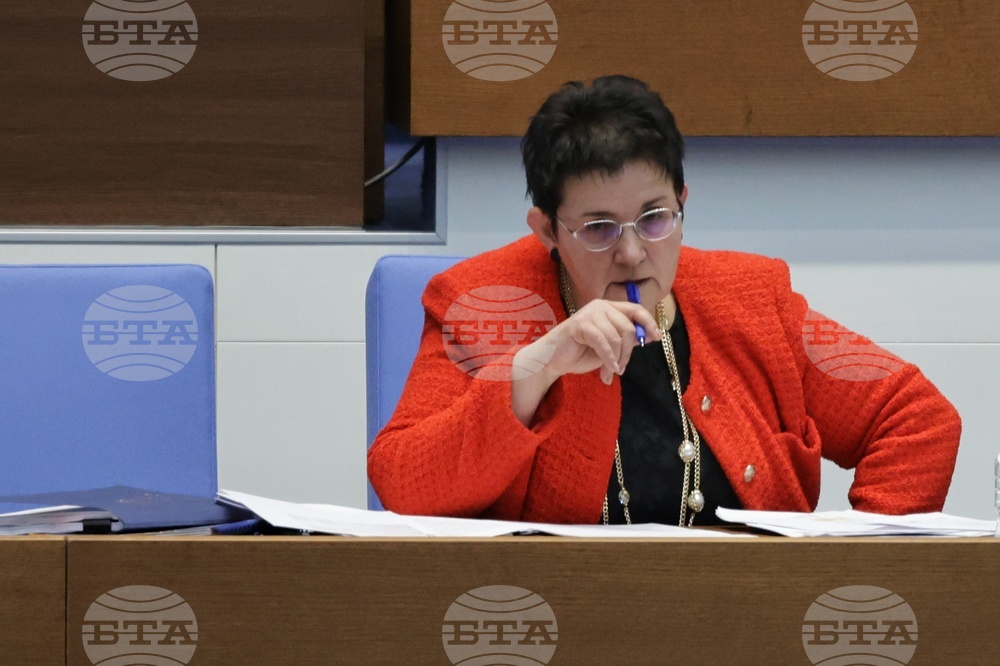site.btaFinance Minister Defends 2025 State Budget Bill against Criticism, Blames "Chaotic" Legislating for Excessive Spending


Caretaker Deputy Prime Minister and Finance Minister Ludmila Petkova Wednesday defended the 2025 State Budget Bill against criticism and said any flaws in it are the result of legislating that she called "chaotic". "The spending part of the budget has been prepared based on the current policies and applicable legislation," she said during a briefing at the Council of Ministers.
Petkova emphasized that the caretaker government adheres to the country’s laws and cannot propose a budget that contradicts the existing legislation. "There have been many opinions from experts and financiers suggesting that expenses should be cut. But I have this question: which expenses are to be cut back, esteemed politicians and experts? Are we talking about salaries and pensions, or capital expenditure programmes?"
"I will not be the finance minister who proposes reducing people's incomes and pensions, nor will I prevent the implementation of national strategic projects and local government projects for water supply, infrastructure, education, culture, and social activities," she commented. According to Petkova, the issue is not with salary and pension expenditures, but rather with the way their increase was decreed without a sound economic basis. "The Ministry of Finance has expressed a negative opinion on all the changes in laws related to the increase in personnel expenditures passed by the National Assembly," Petkova said, adding that these objections were "sent to the west basket".
She further said that it is wrong to blame the Ministry of Finance and the caretaker government. "The National Assembly has full authority to amend, change, or revoke the laws it has passed. The caretaker government does not have the authority to change the laws," she added.
Petkova responded to criticism regarding the "messy" budget, particularly the spending side. "The criticism is aimed at the increase in public sector salaries. We don't like it either: not because salaries were increased, but because the income policy is a mess," she said. "This mess was not created by the caretaker government but by the absence of a comprehensive income policy. Setting in place a system for automatic increase of personnel costs has led to even greater distortions and chaos."
Regarding capital expenditures, Petkova stated that investments are necessary to ensure economic growth and development. She outlined planned capital expenditures for 2025, totaling 14 billions - with 7 billion earmarked for EU-based projects, including EU programs and the Recovery and Resilience Plan (RRP), and another 7 billion for ministries, agencies, and municipalities. These capital expenditures are intended for both ongoing and new projects, she explained. She asked which capital expenditure projects should be cut and said that such a reduction would mean leaving ongoing projects unfinished.
The budget revenues are based on the macroeconomic forecast of the Ministry of Finance, considering the effects of the country’s Schengen membership, the income policy, and the proposed revenue measures to achieve the deficit set by the Public Finance Act. Petkova addressed criticism that the projected revenues were unrealistic, saying, "The proposed budget does not endanger the country's financial stability; rather, it is the chaotic policies and legislation adopted earlier that have been reflected in it."
She also pointed out a shortfall of 3 billion in revenues for 2024 and 1 billion in unaccounted expenses, asking, "Should we claim that the 2024 budget is false? A shortfall of 4 billion?"
Petkova said that each year, overdue declared but unpaid taxes and contributions are written off, amounting to BGN 2 billion. "Shouldn’t the State make an effort to collect the declared but unpaid taxes?" she questioned.
Bulgaria is ranked first in the EU for its share of the gray economy, which accounts for over 30%. With a GDP of over BGN 200 billion, the gray economy represents approximately BGN 65-70 billion, including undeclared and unpaid taxes and pension contributions of BGN 25-26 billion. "Do you think the State shouldn’t try to collect at least part of these taxes and contributions instead of increasing taxes on the honest taxpayers?" Petkova remarked.
She emphasized that unconventional measures must be taken to reduce the gray economy and increase tax compliance. "This could include tax amnesties, which have been applied by some of the largest countries in the world with great effect, leading to billions in recovered revenue," she added.
Petkova concluded that the caretaker government has no grounds to withdraw the budget. "The question is what the National Assembly will decide," she added.
She also touched on the topic of merging the Customs Agency and the National Revenue Agency, a discussion that has been ongoing for some time, she added. "Merging them into one agency would improve efficiency and enhance revenue collection," Petkova said.
/KK/
news.modal.header
news.modal.text